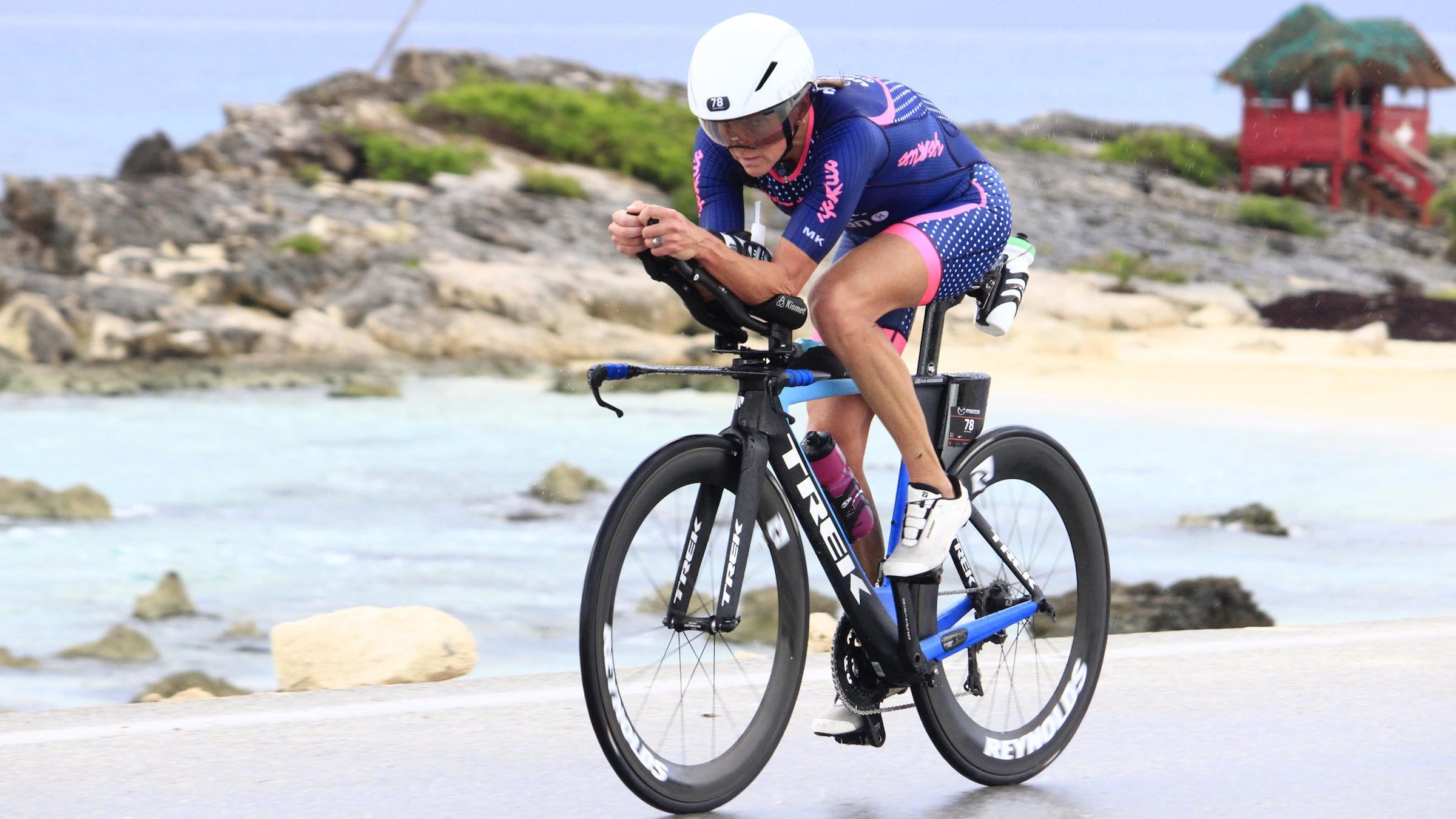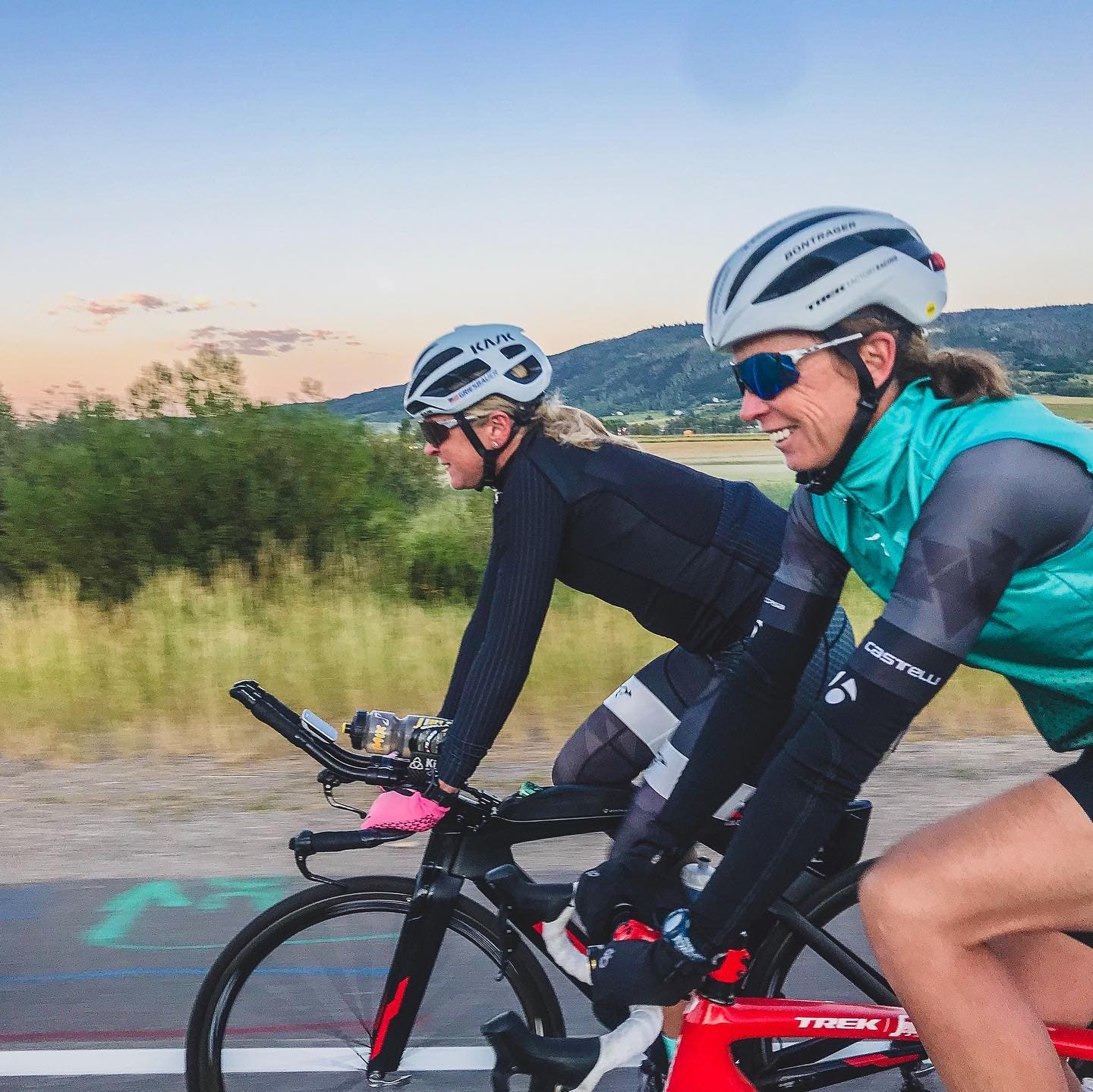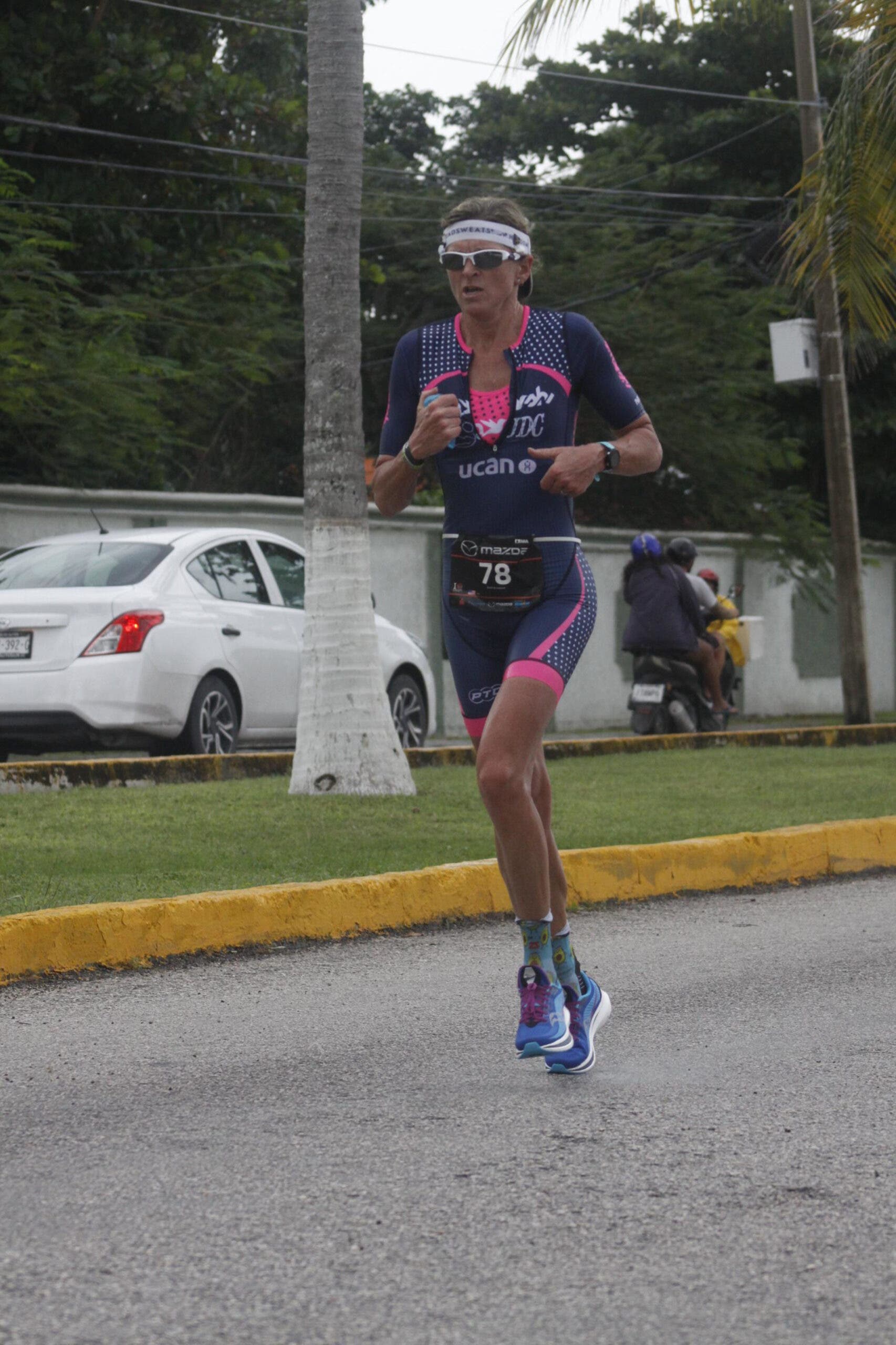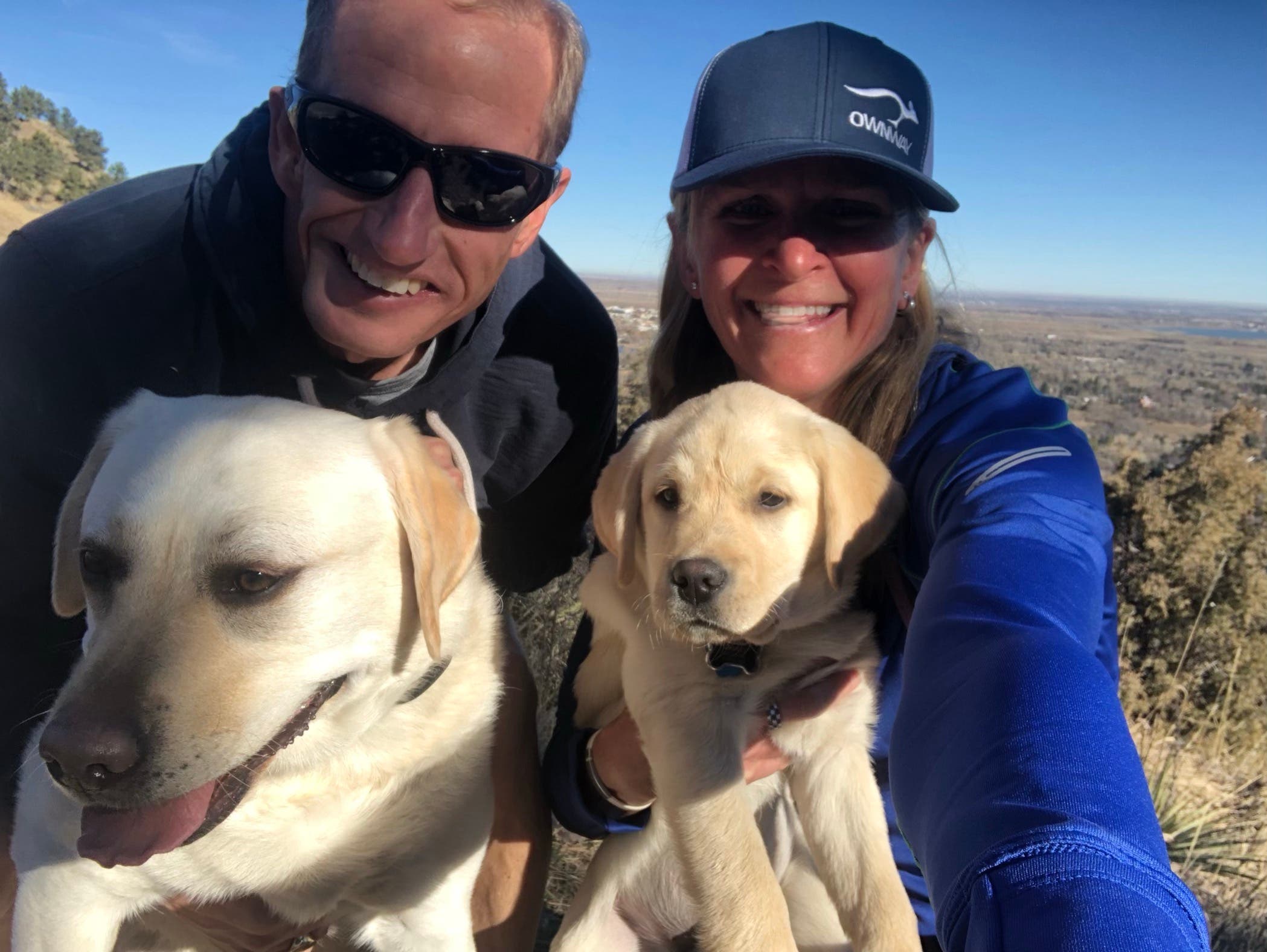Dede Griesbauer Shares Her Secrets to Longevity in Triathlon

Griesbauer on the bike at Ironman Cozumel, November 2021. (Photo: FinisherPix)
Dede Griesbauer was working on a trading desk on 9/11 and still remembers hearing traders on the phone who were trapped on the upper floors of the World Trade Center. It’s arguably something she will never forget. And while her Wall Street days are now very much a speck in the 52-year-old’s rear view mirror, she believes they’ve helped give her a unique perspective on her second career—that of pro triathlete. When it comes to being a full-time pro, she’s putting in a longer shift than most, still training and racing at the highest level despite being more than twice the age of some of the women she’s lining up against. And when the bad days come, as they inevitably do, those haunting memories from that day back in 2001 help keep her laser focused on what’s really important. There is no doubt that training and racing competitively for 20+ years in a sport as demanding as triathlon requires an “all-in” approach—so what can we learn from this stalwart of multisport? Here are her five top tips for staying in the game—and enjoying it—for as long as possible.
RELATED: Fitter & Faster Podcast: How to Stay Fit and Fast As You Age
#1 Love What You Do
“I’m incredibly lucky to honestly and genuinely love what I do: I love the training, I love the journey. I’ve had my heart broken 1,000 times and in a million ways by the sport, but I still love it. I’ve had an entire other life with a “real job”—a good job that I liked, but experience tells me this is way better.
“I don’t feel like I have “bad days.” Not real ones, anyway. I sat on a trading desk on 9/11 and listened to traders at Cantor Fitzgerald on the phone, trapped on the upper floors of the World Trade Center. I traded Enron through the utility crisis and had ulcers from the stress. Now those are bad days.
“Yes, life as a professional triathlete can be hard. It makes you tired. It makes you sore. It humbles the heck out of you nearly every day. It makes you vulnerable and it’s sobering to realize, ‘Hey, you aren’t as good as you thought you were. Not even close.’ And the pay is dreadful. But even when I add all of that up, there’s still nothing else I’d rather be doing. It’s completely absurd when I think about it. And I think that’s part of what I love—I continue to choose it every single day.”

#2 Look After Your Body
“Unfortunately, injury is part of being an athlete. When you push your body as hard as we do, day in and day out, it’s bound to squawk back at you from time to time. The goal is to keep those aches and pains in the category of “niggles,” things that resolve with a few days of rest or things you can manage and train through. Your grandma’s old expression, “A stitch in time saves nine” fits here, though it was a hard one for me to learn. Experience has taught me how to better discern between something I can train through, and something that is more serious. I think I’ve learned over time that it’s better to miss a day or two than have to sit out for six weeks due to serious injury. I’ve learned that just hoping something isn’t serious is an exceptionally poor strategy and, to that end, I pay respect to everything that starts to squawk.
“In 2016, I had a string of injuries, one after another, all seemingly unrelated, but all coming in sequence. I met with a sports medicine doctor here in Boulder who intervened in a big way. She helped shine a light on the fact there were a lot of things I’d been super lazy about (either due to the fact that I’d gotten away with them for so long, or because I was just simply unaware they were having a detrimental impact on my ability to train and perform). As a result, I got much more serious about nutrition, fueling, rest, and recovery. All of these little details we can give lip service to aged 25, or even aged 40, but as you age I’ve found you definitely can’t get away with that. At 52, there are no shortcuts. This means my days are busier, what with daily mobility and prehab/rehab pre- and post-sessions. I work with a nutritionist and log my nutritional intake and that takes time. I also place great value on sleep and go to bed before most toddlers.”
#3 Be Organized and Efficient
“I’ve always been pretty organized and detail-oriented. You could use the word anal—and you wouldn’t be far off, but I just prefer the term “professional.” I’m never one to leave things to the last minute. Being on time means being 10 minutes early for me.
“I’ve been called a laxative before. I just get sh*t done. What with training, body care, coaching with the JD Crew [Griesbauer is one of a team of coaches who work alongside Julie Dibens], working on the mic for Ironman during live broadcasts, and a bit behind the scenes on other small projects, I guess it’s a reasonable load. I also co-manage the Team Psycho Elite Development Program alongside Karen Smyers. Being organized, efficient, and smart about time management is the key for any triathlete who is attempting to juggle a lot, as so many of us do.”
#4 Consistency Matters
“I used to wear bad workouts and bad races like a hair shirt. I see some of my younger training partners do it now and then go pour their souls out on social media about how the ‘struggle is real.’ I want to shake them and make them see that it doesn’t matter that you didn’t make your intervals on the 15 x 200 in the pool, or that you missed your power target by 4 watts. I want them to know that they can still be great athletes, even if they never win an Ironman.
“It’s important to know that no single workout matters and that consistency over time is what matters; that showing up and not making excuses before, during, or after a session is what really counts. I want them to know that at the end of their careers and of their lives, no one will remember what races they faltered in, but rather how they handled those setbacks.”

#5 Surround Yourself with Great People
“I’ve been super fortunate to have mostly great people in my corner throughout my career. And I’ve made really difficult choices when needed. The people on my team are 1000% the reason I’m still able to do this.
“I’ve certainly been influenced and inspired by those who have gone before me. Former Ironman world champ Karen Smyers was my first coach in triathlon and I truly don’t think I could have had a better coach and mentor. She paved the way for me in so many ways. Smyers proved it was possible to race professionally into your 50s and, like everything else, I have clung to her coattails and followed her lead. Mentors like her are once-in-a-lifetime and I’m just so grateful.
“I’ve built a team around me that includes not only my incredible coach, Julie Dibens, and my strength coach, Kate Ligler, but also a great nutritionist, Andrew Dole. In addition, there’s a virtual army of people who help me stay as healthy as can be hoped for: a massage therapist, physical therapist, dry needling, acupuncture, sports psychologist. And, of course, my husband Dave whose endless support makes all of this possible.
“My team isn’t enormous, but I do think it’s hugely important to surround yourself with people who are going to help you get the very best from yourself. I’ve always been a quality over quantity kind of person when it comes to my personal interactions and relationships. I don’t have a million friends. I’m frankly more content with a few really great ones I know would give the shirt off their backs if they knew I needed it.
“From my swimming career, I learned that pretty much no one is going to remember your best times or even the places that you finished in a particular race, even the big ones. Sure, if you win an Olympic gold medal, people might remember that. I swam with literally gobs of Olympians. I know some of them won medals, but I truly can’t remember which ones were gold, silver, or bronze, or how many of each they all have. What I do remember is who was a good teammate and a good friend. I remember who could make us all laugh on the toughest of days, swimming triples while carrying a full academic load at Stanford. The results aren’t necessarily what sticks to you at the end of your career—and certainly no one workout matters—which is why I believe it’s so important to surround yourself with the very best people for you.”
